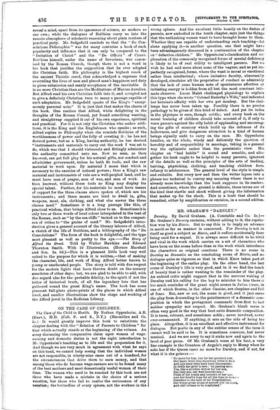ON THE CARE OF CHILDREN.
The Care of the Child in Health. By Nathan Oppenheim, A.B. (Harv.), M.D. (Coll. P. and S., N.Y.) (Macmillan and Co. 6s.) It would greatly improve this book to substitute the chapter dealing with the "Relation of Parents to Children" for that which actually stands at the beginning of the volume. An essay discussing the comparative claim upon women of wage- earning and domestic duties is not the right introduction to Mr. Oppenheim's teaching as to life and the preparation for it. And though we are very much in agreement with what he says on this head, we cannot help seeing that the individual women are not responsible, in ninety-nine cases out of a hundred, for the circumstances that drive them to earn money, and that among those who do become wage-earners are to be found many of the best mothers and most domestically useful women of their time. The women who need to be reached by this book are not those who have made a mistake in the choice of a serious vocation, but those who fail to realise the seriousness of any vocation; the butterflies of every sphere, not the workers in the wrong sphere. And the excellent little homily on the duties of parents, now embodied in the tenth chapter, says just the things that the unthinking women want to have brought home to them. Whether they are capable of understanding such teaching—let alone applying it—is another question, one that might have been advantageously discussed in a continuation of the chapter on ' defective children." Mr. Oppenheim's classification and ex- planation of the commonly recognised forms of mental deficiency is likely to be of real utility to intelligent parents. But we wish he had said more about some of the vaguer, and as yet im- perfectly recognised, forms, where the want is moral or emotional rather than intellectual; where imitative faculty, abnormally developed, simulates all the proprieties of conduct so admirably that the lack of some human note of spontaneous affection or initiating energy is hidden from all but the most constant inti- mate observer. Lucas Malet challenged physiology to explain this type when she wrote "Colonel Enderby's Wife," and indicated her heroine's affinity with her own pet monkey. But the chal- lenge has never been taken up. Possibly there is no precise pathology to be given of this kind of defect. And yet its index in the physique is sure, though subtle ; and every book on the moral training of children should take account of it, if only to warn parents against the silly habit of applauding and encourag- ing the gifts of mimicry which build up the defences of its hollowness, and give dangerous attraction to a kind of human beings signally unfit to carry on the race. Mr. Oppenheim handles, on the whole, wisely and delicately the question of heredity and of responsibility in marriage, taking in a general way the optimistic rather than the pessimistic view. His chapter on "bad habits" is sound and sensible, and alto- gether his book ought to be helpful to many parents, ignorant of the details as well as the principles of the arts of feeding, bathing, physicking, clothing, and teaching children from infancy to adolescence. The general level of the style is simple and suitable. But every now and then the writer lapses into a phrase too technical to convey any meaning where there is not already more knowledge than the book supposes in its readers. And sometimes, where the ground is delicate, these terms are of the kind that startle and shock without giving the information that makes up for the shock. This is a fault that should be remedied, either by amplification or excision, in a second edition.


















































 Previous page
Previous page